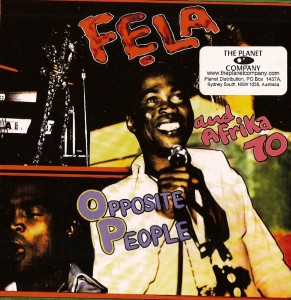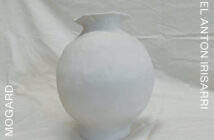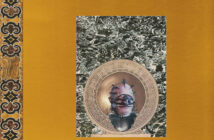
1977’s Opposite People is another hard Afrofunk workout, with even a featured Fela sax solo before he utters a word, which is incidentally about ten minutes into this sixteen and a half minute opus. He weaves in and out of the call and response female backing vocals, before getting more overtly funky with a bit of Nigerian James Brown-feel. It’s probably one his lesser known tunes but, as an expression of people who go against the wishes of the masses, it’s a cracker. Clocking in at about the same time the curiously titled ‘Equalization of the Trouser and Pant’s has a much slower tempo and as a result is a little more jazzier with a great horn riff, a kind of amalgamation of high-life and old school funk, though it’s a relaxed kicked back song, somewhat playful, and of course Fela only pops in with vocals at about ten and a half minutes. It’s metaphorical Fela; using underwear to describe even the most seemingly insignificant article can be incredibly important. So too with people.
Released in 1977 Sorrow Tears and Blood was the first of Fela’s self released albums on his own Kalakuta Records, after being dropped by his label following the raid on his commune. Of course he was forced to go to court to get these masters returned, and was eventually successful. Whilst it’s easy to attribute the sentiments expressed in this piece to the violence Fela and his authorities experienced at the hands of the military and government, the tune was inspired by the 1976 Soweto uprising in South Africa in which students rioted against the forced teaching of Afrikaans. It’s Fela’s Ohio, and it’s easy to see how the events in south Africa appealed to his own struggle against authorities. They leave sorrow tears and blood, their regular trademark he offers on a much moodier, more subdued mid-tempo piece that is laden with enough emotion to be one his best works.
Of course Colonial Mentality was an ongoing theme for Fela, one that he would return to in numerous forms over the course of his career. He talks of judges who put on white wigs to jail their brothers, of putting on the air conditioner to shut out the climate, the African elites adopting the manners and beliefs of their colonial masters and in a sense remaining slaves. The tune has a real grinding slow burn feel, Fela’s sax just grinding away, the music as a whole just grinding along seemingly innocuously until your attention shifts from his vocals to the way this highly repetitive music just keeps coming at you in waves, highlighted by the backup singers just rolling with the groove while Fela goes off to amuse himself at the keyboard.
This collection of two of the albums he created in 1977 demonstrates the effects that the raids on his Kalakuti Republic had. Reaching out to the Apartheid struggle in South Africa it’s hard not to see similarities with his own struggles with the government, with multinational corporations (i.e. his former record company), and the elites in Lagos who continue to do the bidding of white man. Angry eloquent and a little bit cheeky, this is some of Fela’s best work.
Bob Baker Fish



